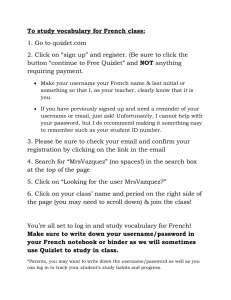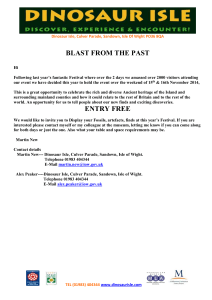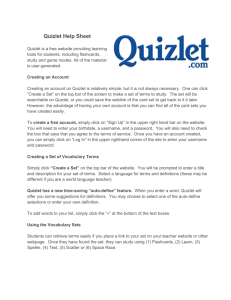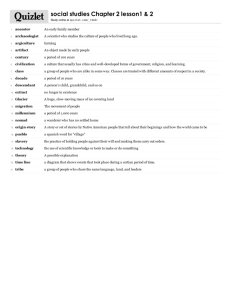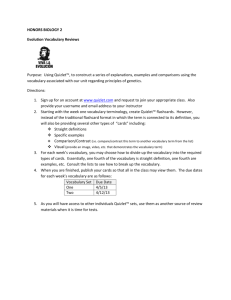Yr 8 Beginners' French Autumn Term Knowledge and
advertisement
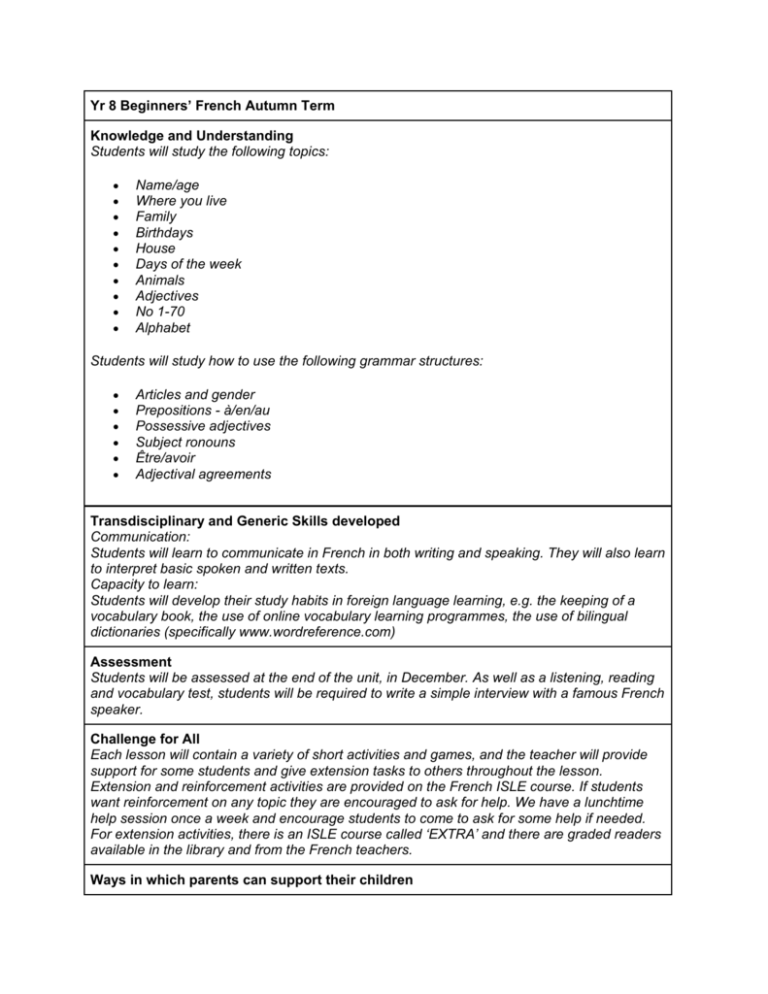
Yr 8 Beginners’ French Autumn Term Knowledge and Understanding Students will study the following topics: Name/age Where you live Family Birthdays House Days of the week Animals Adjectives No 1-70 Alphabet Students will study how to use the following grammar structures: Articles and gender Prepositions - à/en/au Possessive adjectives Subject ronouns Être/avoir Adjectival agreements Transdisciplinary and Generic Skills developed Communication: Students will learn to communicate in French in both writing and speaking. They will also learn to interpret basic spoken and written texts. Capacity to learn: Students will develop their study habits in foreign language learning, e.g. the keeping of a vocabulary book, the use of online vocabulary learning programmes, the use of bilingual dictionaries (specifically www.wordreference.com) Assessment Students will be assessed at the end of the unit, in December. As well as a listening, reading and vocabulary test, students will be required to write a simple interview with a famous French speaker. Challenge for All Each lesson will contain a variety of short activities and games, and the teacher will provide support for some students and give extension tasks to others throughout the lesson. Extension and reinforcement activities are provided on the French ISLE course. If students want reinforcement on any topic they are encouraged to ask for help. We have a lunchtime help session once a week and encourage students to come to ask for some help if needed. For extension activities, there is an ISLE course called ‘EXTRA’ and there are graded readers available in the library and from the French teachers. Ways in which parents can support their children Parents can support their child with learning French even if they don’t speak French by regularly asking them about what they are learning and asking the child to teach them what they have learnt. Encourage the child to make regular use of the ISLE course to revise and review what has been taught in class. At this stage it is essentiel that students develop good revision habits: memorisation of vocabulary and verb conjugations is key - we make extensive use of the online application QUIZLET to aid this process. Your child should study LITTLE AND OFTEN, and use the more ACTIVE learning tools on Quizlet (matching, dictation, selftesting) instead of simply ‘looking at the vocab list’. Links to our numerous Quizlet activities are to be found throughout the ISLE course. Yr 8 Beginners’ French Spring Term Knowledge and Understanding Students will study the following topics: First unit: Weather/seasons Sport & leisure activities Numbers 1-100 Second unit: Food/drink Likes/dislikes Ordering in a café Students will study how to use the following grammar structures: Regular –er verbs Partitives - Du, de la, des, de l’ Irregular verbs - Prendre/boire/manger Negatives Transdisciplinary and Generic Skills developed Communication: Students will learn to communicate in French in both writing and speaking. They will also learn to interpret basic spoken and written texts. Capacity to learn: Students will develop their study habits in foreign language learning, e.g. the keeping of a vocabulary book, the use of online vocabulary learning programmes, the use of bilingual dictionaries (specifically www.wordreference.com) Assessment Students will be assessed at the end of each unit, in February and April. The tests consist of vocabulary, grammar, reading, and writing. The writing assessment will consist of a presentation of the students’ leisure activities. Challenge for All Each lesson will contain a variety of short activities and games, and the teacher will provide support for some students and give extension tasks to others throughout the lesson. Extension and reinforcement activities are provided on the French ISLE course. If students want reinforcement on any topic they are encouraged to ask for help. We have a lunchtime help session once a week and encourage students to come to ask for some help if needed. For extension activities, there is an ISLE course called ‘EXTRA’ and there are graded readers available in the library and from the French teachers. Ways in which parents can support their children Parents can support their child with learning French even if they don’t speak French by regularly asking them about what they are learning and asking the child to teach them what they have learnt. Encourage the child to make regular use of the ISLE course to revise and review what has been taught in class. At this stage it is essentiel that students develop good revision habits: memorisation of vocabulary and verb conjugations is key - we make extensive use of the online application QUIZLET to aid this process. Your child should study LITTLE AND OFTEN, and use the more ACTIVE learning tools on Quizlet (matching, dictation, selftesting) instead of simply ‘looking at the vocab list’. Links to our numerous Quizlet activities are to be found throughout the ISLE course. Yr 8 Beginners’ French Summer Term Knowledge and Understanding Students will study the following topics: Places in town Directions Shopping Students will study how to use the following grammar structures: Au, à la, à l’, aux The verb ‘aller’ Prepositions Acheter/préférer -re, -ir verbs Ne pas/plus de Transdisciplinary and Generic Skills developed Communication: Students will learn to communicate in French in both writing and speaking. They will also learn to interpret basic spoken and written texts. Capacity to learn: Students will develop their study habits in foreign language learning, e.g. the keeping of a vocabulary book, the use of online vocabulary learning programmes, the use of bilingual dictionaries (specifically www.wordreference.com) Assessment Students will be assessed at the end of the unit, in June. The tests consist of vocabulary, grammar, reading, and writing. There will be an end-of-year project in which students make a presentation about themselves and their family, using their own choice of medium. Challenge for All Each lesson will contain a variety of short activities and games, and the teacher will provide support for some students and give extension tasks to others throughout the lesson. Extension and reinforcement activities are provided on the French ISLE course. If students want reinforcement on any topic they are encouraged to ask for help. We have a lunchtime help session once a week and encourage students to come to ask for some help if needed. For extension activities, there is an ISLE course called ‘EXTRA’ and there are graded readers available in the library and from the French teachers. Ways in which parents can support their children Parents can support their child with learning French even if they don’t speak French by regularly asking them about what they are learning and asking the child to teach them what they have learnt. Encourage the child to make regular use of the ISLE course to revise and review what has been taught in class. At this stage it is essentiel that students develop good revision habits: memorisation of vocabulary and verb conjugations is key - we make extensive use of the online application QUIZLET to aid this process. Your child should study LITTLE AND OFTEN, and use the more ACTIVE learning tools on Quizlet (matching, dictation, selftesting) instead of simply ‘looking at the vocab list’. Links to our numerous Quizlet activities are to be found throughout the ISLE course.
